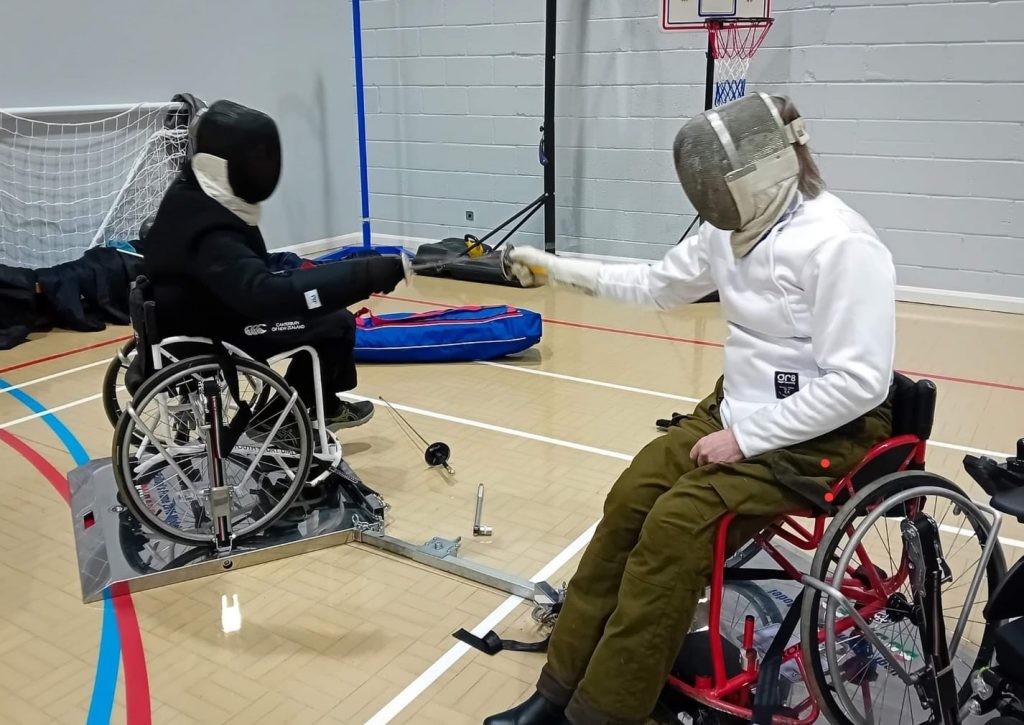

On Wednesday, the Welsh Government held an online Wellbeing Workshop as part of their Disability Taskforce policy co-creation process. Gethin and Derek from Barti Du Fencing in Lampeter shared their story and how participation in the Wheelchair Frame Loan scheme has helped Derek and the club.
The Welsh Disability Task Force are doing these workshops to build a set of recommendations for policies across all aspects of an individual’s life. They will be providing this for the Welsh Government as part of a drive to enshrine better support for disabled people and the UNCRPD in Welsh law.
The morning of the workshop featured a section in which people who had a lived experience of being disabled, or working with disabled people, shared their stories of success and challenge with the taskforce. They gave life to the process and exposed the barriers faced, as well as possible effective solutions to overcoming those barriers. Gethin and Derek shared their experience of Derek’s first reach-out to start wheelchair fencing, and how Gethin set up the club to accommodate Derek’s request. They also talked about how the BF Wheelchair Frame Loan scheme further supported Derek’s training and the club’s ability to include wheelchair users in their activities.
A week after Gethin had been volunteering at the Swansea-based Wheelchair Fencing National Championships last year, Derek approached him. Derek had always been interested in trying fencing as a standing participant, but after an accident that resulted in him now being a wheelchair user, he reached out to Gethin to see if he could participate in wheelchair fencing at Barti Du Fencing Club. Gethin was inspired by the Swansea event and only took a week to get some basic kit together. Gethin also signed the club up to be one of the recipients of the Wheelchair Fencing Frame Loan Scheme, which really improved the opportunities for Derek to participate. Before the frame, it was possible to use the club’s borrowed basketball wheelchairs, but there was some restriction in what could be accomplished. Now with the frame, Derek really feels part of the club and has much more freedom in his range of motion.
Derek said,
“To say [that the addition of the frame] has dramatically changed the opportunity is an understatement, because before it was so easy with the basketball chairs to potentially overturn them with this rig. Now there’s no possibility of that and it’s, you know, so much safer and provides so many more abilities.”
Gethin added,
“We are using [the wheelchair fencing frame] every session even if Derek isn’t attending. It’s quite nice and useful, especially for blade work, I find, because the distance between the athletes doesn’t vary as much. Also what’s good with fencing is, it’s an open skill sport, so the environment changes. Every fencer is a bit different and because of that, there’s a massive mental element to a fencing bout, as well as being good physical exercise.”

Gethin later spoke to us about his experience participating in the workshop .
“It was eye opening and heartening. While it’s good to self-reflect and see what’s happening across other parts of the sporting sector, I find it’s incredibly valuable to provide fencing due to the unique characteristics of the sport. It caters to a broad age of participants, both young and old. Its open skill nature provides mental and physical benefits, which is why it’s usually referred to as physical chess. Being part of the committee was a good way to show our contribution as well and gauging how we can improve and move forward.”
For more information on wheelchair fencing, please visit our Disability Inclusion Zone.
Don’t miss the latest news. Subscribe to our weekly summary email, The Fencing Digest, featuring the previous week’s latest news and announcements. Sign up here.

Sign up to receive regular highlights from the exciting world of fencing - celebrating the best of our unique and inspiring community